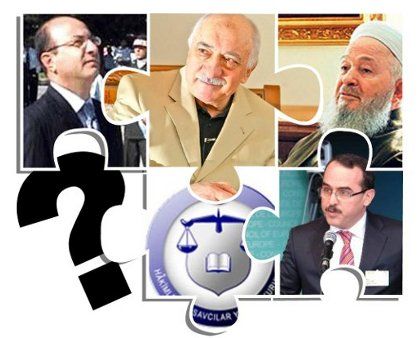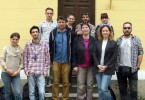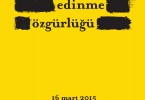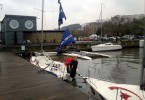Ahmet Şık, Niyazi Dalyancı
The simmering conflict between the nation’s judiciary and the government turned into open warfare this week with the Justice Minister accusing wholesale the judges serving on the Supreme Court (Yargitay) and Supreme Administrative Court (Danistay) of breaking the law and interfering with the free functioning of jurisdiction.
At the center of the controversy was a confrontation between two prosecutors in the eastern towns of Erzurum and Erzincan. The legal battle between the two members of judiciary reached its peak when the plenipotentiary prosecutor in Erzurum managed to bring about the arrest of the Erzincan prosecutor accusing him of staging plans drafted by the suspects in the Ergenekon case to topple the government of Prime Minister Tayyip Erdogan.
Osman Sanal, the plenipotentiary prosecutor in Erzurum interrogated Ilhan Cihaner, the chief prosecutor in the nearby town of Erzincan also ordering the police to search the latter’s home and offices and asked for his arrest, which was promptly carried out by the court.
Hours after Cihaner’s arrest, the Supreme Board of Judges and Prosecutors (HSYK) in Ankara, which is functioning as the supervisory body of Turkey’s judiciary, announced that the authority of Osman Sanal, the plenipotentiary prosecutor in Erzurum and his three assistants has been rescinded and demanded an investigation against them for overstepping their jurisdictional powers.
The legal argument put forward by the HSYK was, first class judges and prosecutors can only be tried for offenses related with their duties by the Supreme Court according to law. HSYK claimed that Sanal and his assistants were not competent authorities to ask for Cihaner’s arrest.
Prosecutor Sanal had also summoned Gen. Saldiray Berk, the commander of Turkey’s 3rd Army that has its headquarters also in Erzincan, but the general responded by saying he cannot come to Erzurum because he is on duty. Sanal also wrote to the headquarters of the Turkish General Staff whether what the general was saying is true. Then he asked Gen. Berk to come over until Feb.26 and testify as a suspect.
The adherents of the Ismailaga community are promised an escape from the sins and commotion of metropolitan life by reviving what they call the “Age of Bliss,” that is the period when Prophet Mohammad and the following four khalifas lived. It is a branch of the larger Naqshi sect of which Fethullah Gulen is one of the leaders.
Members of the community have created islands in big cities like the Carsamba neighborhood in Istanbul where they observe strict rules of attire and life in general. The community takes its name from the Ismailaga Mosque in Fatih, Istanbul.
According to Hurriyet columnist Ahmet Hakan who spent his younger years as a devout Moslem, the Ismailaga community is a circle closed to outside world.
Hakan describes the community as:
“The individual who decides to join the community would undertake to undergo the most radical and difficult change in his life. In order to enter the community one has to obey the conditions of outward appearance. These conditions are:
1. You have to grow a beard
2. You have to wear long cloaks (cubbe) and baggy trousers (shalwar). (There are tailors in Carsamba who provide this outfit sewn according to the rules practiced at the time of Prophet Mohammad.)
3. While praying you have to wear turbans of long and white muslin.
In this way you will be different from others and within this difference you will be a part of that ‘small neighborhood of bliss’ that challenges the ’/21st Century.”
“If somebody with a developed sense of secularism walks through the Carsamba neighborhood, his hair will stand on end seeing these people clothed in such uniformly attired people,” adds Hakan.
Of course, the women of the community wear charshaff that only leaves the eyes exposed to the outside world.
Two consecutive killings in 1998 and 2006 brought the community into limelight. In 1998 the son-in-law of Mahmut Ustaosmanoglu, the leader of the community was slain in the Ismailaga mosque during prayers. In 2006, a retired imam was also stabbed to death in the same mosque allegedly by a mentally deranged man who was lynched on the spot. The killer of Ustaosmanoglu’s son-in-law was never caught and no legal case was brought up after the lynching of the second killer in the mosque.
Although Hakan claims that the community prefers to stay out of politics, during the investigation in Erzincan by the now jailed prosecutor Ilhan Cihaner, telephone conversations were intercepted involving ministers and businessmen close to the government asking favors like granting of government tenders or employment of community members in government agencies oh behalf of the Ismailaga group.
The whole story began in 2007 when at a meeting of local authorities in Erzincan, including the governor, the commander of the gendarmerie and police chief, intelligence reports were discussed about the activities of a rather notorious and secretive radical Islamic group called the “Ismailaga Community” named after the mosque in Istanbul’s Fatih neighborhood where they congregate. The reports claimed that the local members of the community were preventing young girls to attend school and they were operating clandestine Koran courses without the consent of the Religious Affairs Directorate in Ankara.
Prosecutor Cihaner opened an investigation into these allegations but the report from the police stated that no illegal activity was found on the part of the community in Erzincan. The prosecutor then asked the local gendarmerie and the local National Intelligence Organization (MIT) to conduct another investigation. The report written by the gendarmerie and MIT contradicted the police report and it also included financial irregularities, nepotism and other such misdemeanors by the community in addition to running illegal Koran courses and similar radical activities.
Cihaner obtained a court ruling for tapping the telephones of the local members of the community and according to reports in the media many businessman, politicians, mayors and even the names of some government ministers were intercepted.
A sweeping operation against the community that would have covered at least half a dozen cities including Istanbul was thwarted when the police raided the houses some of the suspects in Erzincan alerting the suspects elsewhere. Some newspaper reports claimed that a “mole” in the police alerted the possible suspects and prevented a wider operation against them.
Finally, in February 2009, Cihaner used the gendarmerie in an operation that was kept outside the knowledge of the local police and arrested nine people. Following their interrogation the prosecutor drew a list of 235 suspects. But that list was going to seal his fate for the names included businessmen close to the government as well as several government ministers and mayors, including Kadir Topbas, the metropolitan mayor of Istanbul.
At this stage, Cihaner claims that Deputy Prime Minister Cemil Cicek called him and asked him to stop the investigation and release the arrested people. It was only a few weeks to local elections and such an investigation would put the government in a difficult position. The prosecutor refused to desist.
Linked to Ergenekon
In June 2009, the Taraf newspaper published the controversial secret document allegedly drafted by Navy Capt. Dursun Cicek entitled “Action Plan against Religious Radicalism.” The plan included schemes like planting weapons in houses used by the Fethullah Gulen community and a media campaign to discredit the government of Erdogan. According to Taraf the Action Plan was written in April 2009, some 17 months before Cihaner had launched his investigation against the Ismailaga Community. But this discrepancy did not deter the pro-government newspapers to accuse Cihaner of putting this plan into action well before it was written. Meanwhile, Cihaner had also initiated a second inquiry into the activities of the Fethullah Gulen supporters.
An unlikely Ergenekon member
However, the personal record of Cihaner shows that he is an unlikely person to become part of the so-called “Deep State.” In 1989 while he was serving at the town of Idil near Mardin in southeastern Turkey, he had initiated an investigation against the controversial JITEM, a paramilitary, clandestine organization allegedly the culprit of numerous unsolved assassinations especially in the Kurdish areas. The military and the Headquarters of the Gendarmerie which theoretically functions under the Ministry of Interior keep denying that JITEM ever existed as an official branch of the security forces despite solid evidence to the contrary.
The Justice Ministry opened an investigation through its inspectors against Cihaner using these press reports as a pretext.
During the course of these developments, the plenipotentiary prosecutor of Erzurum Osman Sanal appeared on the scene and asked Cihaner to transfer the Ismailaga case to under his authority. The legal reason was an unsigned letter by an informer who claimed that the Ismailaga community under investigation was an “armed group,” as such it came under the jurisdiction of the plenipotentiary prosecutor. Cihaner resisted by arguing that there was no indication whatsoever that the group was involved in armed action.
Furthermore, Cihaner said he was in possession of the transcripts of a telephone conversation between two suspects where one of them giving the other the “good news” that the case would be moved to Erzurum.
The legal tug-of-war between the two prosecutors ended up with the Ismailaga case moving to Erzurum.
Now it was the turn of the gendarme officers and MIT members who were involved in the investigation of the case to be prosecuted. On October 27, 2009 the Erzincan police received information that there were weapons and ammunition hidden in a dump near a village outside Erzincan. Plenipotentiary Prosecutor Sanal and Erzincan police conducted the search near a dried out lake. About a dozen hand grenades, rocket launchers and ammunition were found during the search as well as a GSM telephone and separately a SIM card were found. So those who dumped the ammunition also left on the same spot clues that would lead to their identities.
The suspects that the evidence pointed at were no other than the gendarme officers who had conducted the investigation against the Ismailaga community. Three gendarme officers were arrested in November 2009 and in February 2010, Col.Ali Tapan, the commander of the Gendarmerie Regiment in Erzincan was also arrested. MIT offices in Erzincan were raided by police under the direction of Prosecutor Sanal where a possible misfortunate armed confrontation between the MIT guards and police was closely averted. The guards did not allow the police enter MIT premises asking them to produce permission from their headquarters in Ankara. Three local MIT officials were also arrested. All those arrested face charges of plotting against Ismailaga and Fethullah Gulen communities linking them with the Ergenekon case in Istanbul.
Top judiciary supports HSYK
Following the announcement of HSYK that the authority of Plenipotentiary Prosecutor Sanal and his three assistants have been rescinded, both the Supreme Court (Yargitay) and the Supreme Administrative Court (Danistay) issued statements that they support the move.
Chief Justice Hasan Gerceker of the Supreme Court emphasized that the decision taken by HSYK is in conformity with law and added that such incidents taking place within their own ranks have “caused great concern among the members of the judiciary.”
In a written statement the Chief Prosecutor of the Supreme Court announced that he has launched an investigation whether the judiciary is interfered with political motives. For this purpose, the announcement said, the cases in Erzurum, Erzincan and Habur are being scrutinized. Habur is Turkey’s border point with Iraq from where 34 Kurds, 8 of them ostensibly wearing PKK’s guerrilla uniforms came and surrendered to Turkish authorities in October last year to contribute to the peace effort. They were all set free after a brief questioning by a makeshift court that was set up there for the occasion.
The Chief Prosecutor Abdurrahman Yalcinkaya had opened a case to shut down the Justice and Development Party (AKP) of Erdogan two years ago on charges that the party has become the focal point of anti-secular activities violating the constitution. The Supreme Court that also serves as the Constitutional Court stopped short of
closing down the party although it confirmed the charges in its final ruling.
The written statement by Yalcinkaya’s office is generally interpreted as the harbinger of a new case against AKP.
Justice Minister declares war on high courts
Justice Minister Sadullah Ergin at a late evening statement after his meeting with Prime Minister Erdogan told reporters that the statements coming from both the Supreme Court and Danistay constituted interference to the free functioning of the judicial process and the independence of courts.
“The HSYK has overstepped its authority by this move. Among the definition of the tasks that HSYK had been authorized by law, there is no stipulation that it can interfere with an ongoing legal process being carried out by independent prosecutors and judges,” said Ergin.
It is neither the business of Yargitay or Danistay or the Chief Prosecutor to speak about ongoing cases, Ergin said.
He added that the statements made by representatives of both the Supreme Court, and the Supreme Administrative Court supporting the HSYK were “unconstitutional.”
“The present situation indicates that a judicial reform is imperative more than ever,” he added.
The squabble that has brought Turkey to the brink of a full political crisis with almost all the sectors of the society divided over the issue increasing social tensions will continue; but at this stage no clear victory for the either of the warring parties seems at hand.







